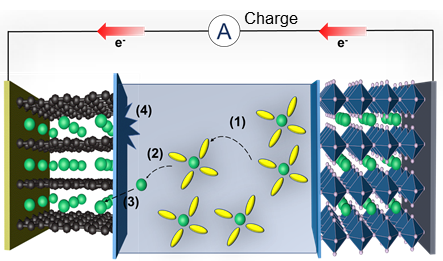《Research progress of non-aqueous electrolyte in low-temperature lithium-ion battery》
Lithium-ion batteries (LIBs) have found widespread applications in diverse sectors, encompassing mobile devices, electric transportation, and energy storage systems. The high melting point and the sluggish ion transfer of conventional carbonate electrolytes under cold conditions pose challenges, resulting in diminished output power of battery or even battery failure. These measures, including introduction of component solvents with low melting point, reducing the proportion of ethylene carbonate solvents or designing ethylene carbonate-free electrolytes, effectively widen the electrolyte's liquid range and enhance ionic conductivity, thereby mitigating battery’s polarization and augmenting LIB performance at low-temperature. In this paper, the failure mechanism and lithium precipitation behavior of LIBs at low temperatures are first analyzed from the perspective of the electrolyte. On this basis, research results and modification strategies on low-temperature electrolyte in the past five years are discussed, including the selection of solvent molecules, lithium salts and film-forming additives. Additionally, recent innovations in electrolyte design, including high-entropy electrolytes, diluted high-concentration electrolytes, and weakly solvated electrolytes, are introduced. Finally, a comprehensive examination of the advantages, drawbacks, and scientific challenges associated with low-temperature electrolyte design strategies is presented, culminating in proposed future directions in light of the current state of the field.


 网站首页
>
正文
网站首页
>
正文